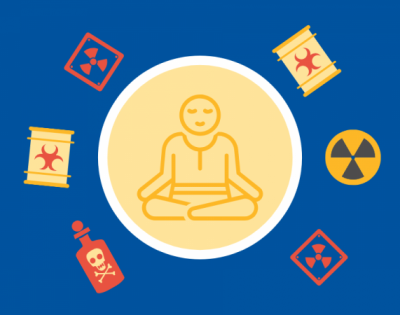
Some people make us feel bad about ourselves. When we spend time with them, we might engage in destructive behaviors. They don't bring out the best in us. These people are toxic influences.
According to Mental Health America, 84% of women and 75% of men report having had a toxic friend at some point. And about three-fourths of US employees have or have had a toxic boss.
It’s important we begin to recognize who those people are and create boundaries to improve our mental and physical health. Take the time to identify the toxic relationships, behaviors and situations in your life.
As part of its Mental Health Month #Tools2Thrive initiative, Mental Health America outlines these eight traits of toxic people:
8 Traits of Toxic Influences
1. Manipulative
They use the knowledge they gain about you to try and get you to do what they want. They will often twist your words or make you feel guilty to get their way.
2. They make you feel bad about yourself
Insults are the most direct way that toxic people can make you feel bad, but most of the time the ways they affect your self-esteem are more subtle. When you are feeling happy or proud of yourself, they will find ways to “rain on your parade” or downplay your achievements. They might also act like they are smarter than you to make you feel dumb or insignificant.
3. Being judgmental
Everyone can be judgmental from time to time, but a toxic person is judgmental almost all of the time. They see things in black and white and criticize anything that they don’t agree with or approve of, instead of considering the circumstances or the feelings of other people.
4. Negativity
Some people just can’t seem to see the good in life. They will find something bad about everything and aren’t able to find joy in anything. Being around someone like this can make it hard for you enjoy yourself and be positive. Sometimes it can be easy to confuse the symptoms of depression for negativity, so it is worth having a conversation with someone to determine if they need help getting through depression or if they are truly being toxic.
5. Passive aggression
These behaviors are a way that people express their discontent without having a conversation about their problems. This type of hostility is less obvious than anger and can be shown in a number of different ways. Some forms of passive aggression include snide comments, sabotaging the efforts of other people, and purposefully doing something or not doing something to make things inconvenient for someone or get them upset.
6. Self-centered
Toxic people care mostly about themselves. They don’t think about how their actions affect others and believe they are better than everyone else. Someone who is self-centered is focused on getting what they want and is unlikely to compromise or consider another person’s point of view.
7. Difficulty managing their anger
Someone who has trouble managing their anger will make you feel like you are walking on eggshells every time you are around them. The littlest thing can trigger them into a fit of rage, and often nasty, hurtful things are said while they are in this mental state. There may be apologies the day after, but often they are insincere and the toxic person will repeat their angry, hurtful behaviors soon after.
8. Controlling
One of the most dangerous traits of a toxic person is controlling behavior. They may try to restrict you from contacting your friends or family, or limit resources like transportation or access to money to restrict your ability to interact with the world around you. If you are in a situation where someone is trying to restrict your movements or communication, this is domestic abuse and requires immediate action.
Detoxifying Your Relationships
Identifying the toxic influences in your life is the first step. The next step is to create boundaries. Ask yourself, "What is the thing that I need to stop or get out of my life?" It could be a person, behavior or situation. What are desirable or healthy characteristics that you want more of? What will be unacceptable to you moving forward?
Building your confidence will help you to set and reinforce these new boundaries. Think through things you can say to toxic influences when they cross the line. For example, "If you do (this), I'm going to leave the room." Remind yourself that you deserve to have healthy relationships.
Identifying the toxic influences in our lives and taking steps to create boundaries or a new life without them can improve mental and physical health over time.
Counselors at The Village Family Service Center can help you build your confidence and teach you tools to establish and reinforce boundaries. Call your local office or request an appointment today.




